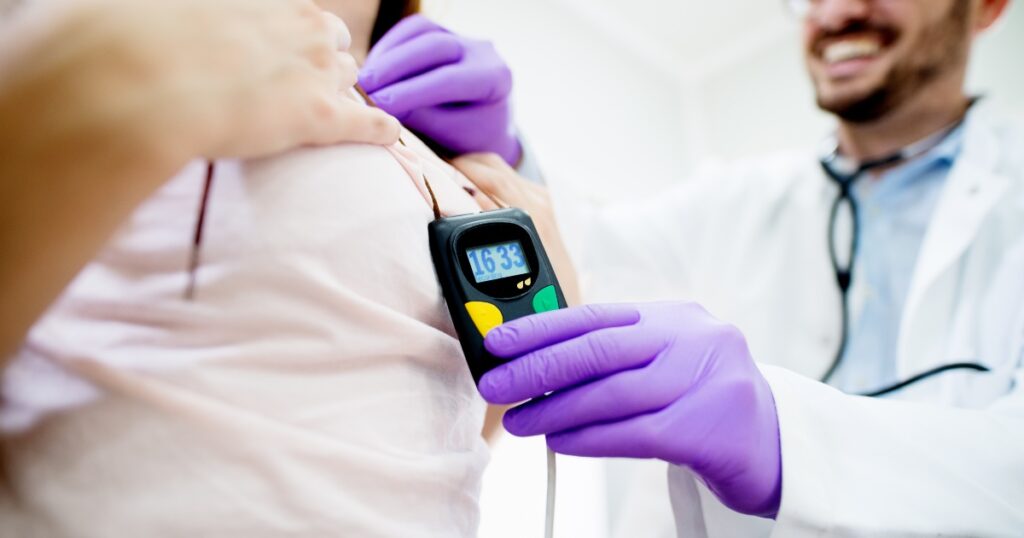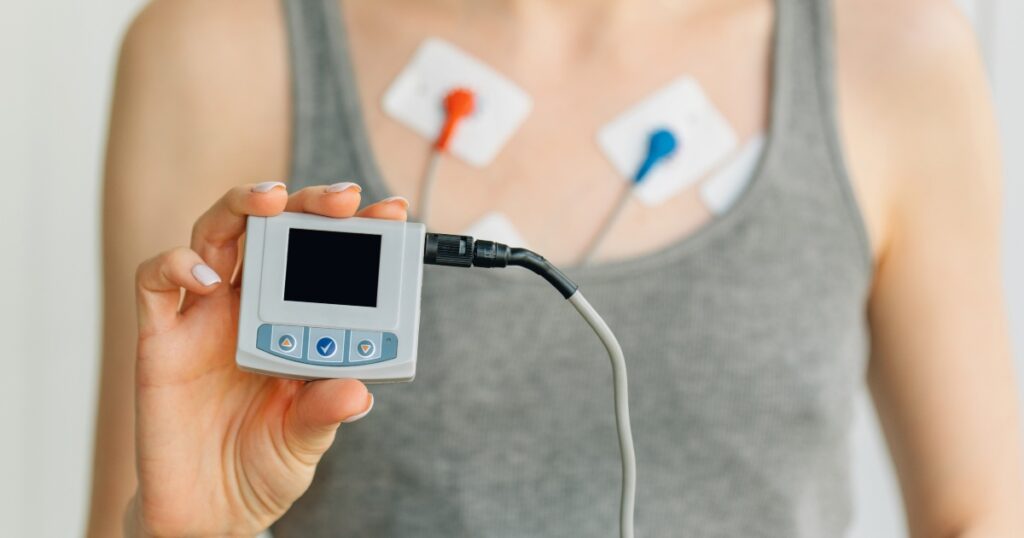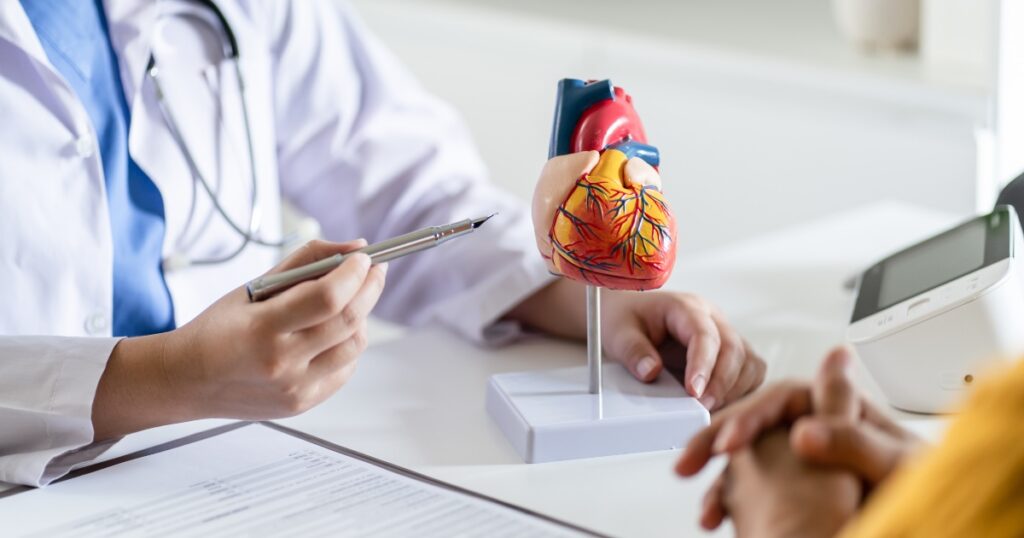Wearing a Heart Monitor for 2 Weeks: What You Need to Know
Heart monitors play a crucial role in monitoring and assessing the health of the cardiovascular system. The device is designed to track the electrical activity of the heart over an extended period, providing valuable insights about heart rhythm irregularities, symptoms, and overall heart health. One common type of heart monitoring device is the Holter monitor. It observes your heart’s activity 24 hours a day and helps identify serious cardiovascular problems.

Master your heart health now
Take part in our 60sec quiz and get a heart health plan tailored just for you.
Contents
Why Wear a Heart Monitor for 2 Weeks?
Wearing a heart monitor for 2 weeks offers distinct advantages in monitoring and evaluating heart health beyond what a shorter monitoring period can provide.
Monitor continuous heart activity
A two-week monitoring period allows for a more comprehensive view of your heart’s activity. It also ensures that a wide range of heartbeats and activities are captured. This extended observation is particularly crucial for identifying irregular heartbeats that might not occur during a short monitoring window.
Detect intermittent symptoms
Some heart conditions, like arrhythmia, can manifest intermittently. By wearing a heart monitor, you increase the likelihood of capturing insights during episodes of symptoms like chest pain or dizziness. This information can help your healthcare provider correlate symptoms with specific heart events and make accurate diagnoses.
Record abnormal heart rhythms
Certain abnormal heartbeats can lead to more serious health issues, such as stroke or heart failure. A two-week monitoring period enhances the chances of capturing irregularities that could be indicative of underlying heart conditions. Detecting these abnormalities can prevent potential complications.
Start managing your heart health now!
Find out what works for you with this 60sec quiz.

Types of Continuous Heart Monitors
Continuous heart monitoring devices come in various forms to provide comprehensive insights into heart activity over extended periods. There are two main types of continuous heart monitoring devices: a Holter monitor and a cardiac event monitor.
Holter monitor

A Holter monitor is a small device designed to detect and analyze abnormal heartbeat, also known as arrhythmias. Traditional electrocardiograms may not provide enough information about the condition of the heart, so the doctor may ask you to wear a Holter monitor. Overall, Holter monitors are reliable and non-risky devices, providing useful insights about your heart health for the doctors so they could make appropriate health decisions for patients.
Cardiac event monitor

A cardiac event monitor is designed to capture and record specific cardiac events or symptoms as they occur. Unlike continuous monitoring provided by the Holter monitor, a cardiac event monitor is typically used for a few weeks to several months. Cardiac event monitors are useful for capturing symptoms, such as dizziness or fainting, that might not be caught during a traditional ECG or even a Holter monitor test.
The Process of Wearing a Heart Monitor
There are several steps that ensure accurate and comprehensive statistics collection during a continuous heart monitor test.
Setting up and wearing the device
Most heart monitoring devices, including the Holter monitor, use adhesive patches or electrodes that stick to your skin. The adhesive patch is positioned to accurately capture the heart’s electrical signals. Typically, three to five patches are placed on specific locations around the chest. Wearing a heart monitor should be as unobtrusive as possible, allowing you to continue your daily life while the device collects data. It’s important to wear a Holter monitor or cardiac event monitor as advised by the doctor. Adhering to the doctor’s instructions ensures that the collected information is accurate and valuable for diagnosing and managing your heart health.
Daily activities and restrictions
While wearing a heart monitor, it’s important to be mindful of certain daily activities and restrictions to ensure accurate information collection and maintain your overall health.
Engaging in regular exercise is generally encouraged for maintaining heart health. However, it’s advisable to inform your healthcare provider before beginning any new exercise routine while wearing a heart monitor.
Many heart monitors, including the Holter monitor, are not designed to be waterproof. It’s recommended to avoid hot tubs, pools, or other water activities.
Certain electrical appliances and high-voltage areas can interfere with the accurate functioning of a heart monitor. To ensure reliable information collection, it’s advised to avoid proximity to high-voltage equipment and other electrical appliances, such as MRI machines and metal detectors.
Analyzing the Data

When analyzing the information collected by a heart monitor, medical professionals gain insights into the heart’s rhythm and potential irregularities.
Medical professionals closely analyze the ECG line tracings for any deviations from the normal rhythm. Abnormalities can include:
- Atrial fibrillation. This is one of the most common arrhythmias. It’s characterized by rapid, irregular contractions of the atria (upper chambers of the heart), which can increase the risk of blood clots and stroke.
- Arrhythmias. Various types of irregular heart rhythms can be identified, such as bradycardia (slow heartbeat), tachycardia (fast heartbeat), and premature beats (extra heartbeats that disrupt the regular rhythm).
- Pauses. A pause in the heart’s electrical activity can indicate issues with the heart’s natural pacemaker or conduction system.
Start managing your heart health now!
Find out what works for you with this 60sec quiz.

Post-Monitoring: Next Steps and Treatment

You will need to return the heart monitor to your doctor’s office as per their instructions. This allows the healthcare team to retrieve and analyze the information. Your doctor will review the test results collected by the heart monitor and discuss their findings with you. If the information collected reveals abnormal heartbeats, arrhythmias, or other issues, your doctor might ask to do other tests and discuss potential treatment options for follow-up care.
As you navigate your heart health journey, consider leveraging tools like Cardi Health, an application that offers personalized heart care and guidance. Cardi provides access to general health information, personalized fitness and dietary recommendations, and convenient monitoring solutions to support your heart health goals. The application can be a valuable companion in your commitment to maintaining a healthy heart.
FAQ
Here are answers to some FAQs to help you better understand heart monitoring.
Is it normal to wear a heart monitor for 2 weeks?
Yes, wearing a heart monitoring device for two weeks can be normal, especially when irregular heart rhythms or symptoms are suspected.
What does wearing a heart monitor for a week show?
It offers an extended observation period, crucial for identifying intermittent irregularities, like arrhythmias, that might go undetected in shorter sessions, thus providing a more accurate representation of heart health.
What kind of heart monitor do you wear for 14 days?
It is typically the Holter monitor, a portable device that continuously records heart activity. There are also other devices, like the cardiac event monitor, that offer longer monitoring durations, providing a more comprehensive assessment of heart rhythms and potential irregularities over an extended period.
Start managing your heart health now!
Find out what works for you with this 60sec quiz.

Conclusion
There are two main types of continuous heart monitoring devices: Holter monitors and cardiac event monitors. Monitoring a patient’s heart for two weeks is of vital importance for catching intermittent irregularities and detecting arrhythmias. It offers a comprehensive evaluation of heart health that shorter monitoring sessions might miss. Embracing this process, following medical guidance, and adopting heart-healthy habits are essential for safeguarding your well-being. Your commitment to your heart health empowers you to make informed decisions and lead a healthier life.
Related articles
Best Foods to Lower Cholesterol
Does Caffeine Raise Blood Pressure?
Does Drinking Water Lower Blood Pressure?
Causes of High Blood Pressure at Night
10 DASH Diet Breakfasts for a Healthy Start
Heart-Healthy Diet Guide
What Should an 85-Year-Old Blood Pressure Be?
What is Normal Blood Pressure for a 70-Year-Old?
How to Read Blood Pressure: A Comprehensive Guide
Manage your heart health now
Find out what works best for you with this 60sec quiz and get your personalized heart health plan.

